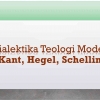The Development of Modern Era Thought and Philosophy is divided into 3 periods
1. The Renaissance
In Latin, the Renaissance comes from the words re and nasci meaning rebith, meaning the rebirth of classical culture, namely Greek and Roman culture. This term is commonly used by historians to refer to various periods of intellectual revival, especially those that took place in Europe, and more specifically in Italy, throughout the 15th and 16th centuries. The term was originally used by the famous historian, Michelet and was developed by J. Burckhardt (1860) for historical concepts that point to periods of indivdualism, the rise of antique culture, the discovery of the world and humans, as periods opposed to the medieval period. The work of philosophy in this century is often called the Renaissance philosophy.
The Renaissance is a historical era full of progress and change that has meaning for the development of science. The era witnessed the launching of a reform movement towards the oneness and supremacy of the Roman Catholic church, along with the development of Humanism [13]. This era is also a refinement of art, expertise, and knowledge embodied in the versatile genius, Leonardo da Vinci. The discovery of printing (about 144 AD) and the discovery of a new continent (1492 AD) by Columbus gave a harder push to achieve scientific progress. The rebirth of literature in England, France and Spain. At that time the art of music also developed. The discovery of astronomers such as Copernicus and Galileo became the basis for the emergence of modern astronomy which was a turning point in scientific thought and philosophy.
So the main characteristics of the Renaissance are humanism, individualism, detachment from religion (do not want to be governed by religion), empiricism and rationalism.
2. Rationalism
The background to the emergence of rationalism is the desire to free oneself from all traditional (scholastic) thinking, which was once accepted but turned out to be unable to handle the results of the knowledge at hand. What Aristotle planted in his mind at that time was also still influenced by delusions.
Rationalism is one of the main philosophical schools which lays the conceptual impact of epistemology. In the view of adherents of rationalism with a rational process, namely through reasoning, knowledge can be achieved in a valid and valid way. Rational philosophy understands that reason (reason) is the most important tool in gaining knowledge and testing knowledge. If empiricism says that knowledge is obtained by experiencing empirical objects, then rationalism teaches that knowledge is obtained by thinking. Tools in thinking are logical rules or logical rules. [24] In compiling knowledge, Rationalists use deductive reasoning.
Rationalism is of two kinds: in the field of religion and in the field of philosophy. In the field of religion rationalism is the opposite of authority, in the field of philosophy rationalism is against empiricism. figures of this period are Descartes. Spinoza (1632-1677), Leibniz (1646-1716).
3. Emphasis
Empiricism is a philosophical doctrine that emphasizes the role of experience in gaining knowledge and knowledge itself, and understands the role of reason. The term empiricism is taken from the Greek empeiria which means trial or experience. As a doctrine, empiricism is the opposite of rationalism. To understand the contents of this doctrine, it is necessary to first understand the two main characteristics of empiricism, namely regarding the theory of meaning and the theory of knowledge. As the characters are Thomas Hobbes, John Locke, and David Hume. Because of the progress of science can be felt the benefits, then the views of people facing philosophy began to decline. This is because philosophy is considered to be no longer useful for life. On the other hand, science has enormous benefits for life. Then assume that useful, certain, and true knowledge is only obtained through the senses (empiric), and empirically is the only source of knowledge. This thinking was born with the name Empiricism.









